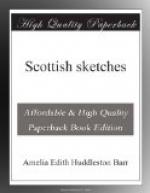“I hae been thinking, Davie, I would go and look o’er Hastie’s affairs, and if I like the look o’ them I’ll buy the whole concern out for you. Partners are kittle cattle. Ye will hae to bear their shortcomings as well as your ain. Tak my advice, Davie; rule your youth well, and your age will rule itsel’.”
“Uncle, you forget that Robert Leslie is in treaty with Hastie. It would be the height of dishonor to interfere with his bargain. You have always told me never to put my finger in another man’s bargain. Let us say no more on the subject. I have another plan now. If it succeeds, well and good; if not, there are chances behind this one.”
John fervently hoped there would be no more to say on this subject, and when day after day went by without any reference to Hastie or Robert Leslie, John Callendar felt much relieved. David also had limited himself to one glass of toddy at night, and this unspoken confession and reformation was a great consolation to the old man. He said to himself that the evil he dreaded had gone by his door, and he was rather complacent over the bold stand he had taken.
That day, as he was slowly walking through the Exchange, pondering a proposal for Virginia goods, Deacon Strang accosted him. “Callendar, a good day to ye; I congratulate ye on the new firm o’ Callendar & Leslie. They are brave lads, and like enough—if a’ goes weel—to do weel.”
John did not allow an eyelash to betray his surprise and chagrin. “Ah, Strang!” he answered, “the Callendars are a big clan, and we are a’ kin; sae, if you tak to congratulating me on every Callendar whose name ye see aboon a doorstep, you’ll hae mair business on hand than you’ll ken how to manage. A good day to you!” But Deacon Callendar went up Great George street that day with a heavy, angry heart. His nephew opened the door for him. “Uncle John, I have been looking all over for you. I have something to tell you.”
“Fiddler’s news, Davie. I hae heard it already. Sae you hae struck hands wi’ Robert Leslie after a’, eh?”
“He had my promise, uncle, before I spoke to you. I could not break it.”
“H’m! Where did you get the L2,000?”
“I borrowed it.”
“Then I hope ‘the party’ looked weel into the business.”
“They did not. It was loaned to me on my simple representation.”
“‘Simple representation!’ Vera simple! It was some woman, dootless.”
“It was my mother’s aunt, Lady Brith.”
“Ou, ay! I kent it. Weel, when a bargain is made, wish it good luck; sae, Jenny, put a partridge before the fire, and bring up a bottle O’ Madeira.”
It was not however a lively meal. John was too proud and hurt to ask for information, and David too much chilled by his reserve to volunteer it. The wine, being an unusual beverage to John, made him sleepy; and when David said he had to meet Robert Leslie at nine o’clock, John made no objection and no remark. But when Jenny came in to cover up the fire for the night, she found him sitting before it, rubbing his hands in a very unhappy manner.




